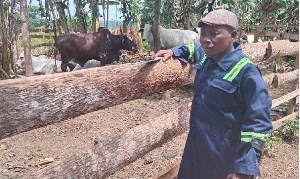Wa, Jama, Jan 9, GNA - Many parents in the Upper West Region prefer to give out their girls for marriage than to educate them, due partly to the high bride prices of cash and cows.
Besides that, the number of in-laws parents received during funerals and other festive occasions measure up their status in society, hence their delight in giving out their daughters for marriage. Mrs. Scholastica Gyiele, Wa Municipal Director of Education disclosed these during a two-day seminar organised by Northern Network education development (NNED) for chiefs and other stakeholders in education in the region.
The seminar, which was sponsored by Commonwealth Education Fund, among other things enlightened chiefs on the importance of education and urged them to flash out traditional practices that impede education in the region.
Mrs. Gyiele said betrothal a practice, which parents give out their girls for marriage was contributory to the high rate of illiteracy among girls in the region and called for the formulation of by-laws in this stead.
She denounced the high expenditure on funerals and marriages at the expenses of education and urged chiefs and other traditionalists to reduce the expenditure.
Mrs. Gyiele also attributed the high rate of school drop-outs, particularly girls to polygamy where there are so many children to be taken care of.
"When so many children come to compete for education and other resources, then they prefer to withdraw the girls, because they believe that they would soon marry and move out of their biological families." Naa S.D. Gore II, Paramount Chief of the Dorimon Traditional Area, called on various district assemblies in the region to enact bye-laws that would empower the Ghana Education Service to punish parents who refuse to send their children to school.
He also suggested that, parents who refuse to send their children to school should be made to pay higher taxes in their various homes. Mr Eric Dourinaa, Co-ordinator of NNED said his outfit would soon initiate discussions towards the formation of education committees within the Regional Houses of Chiefs to engage them fully in the policy.
Regional News of Friday, 9 January 2004
Source: GNA












